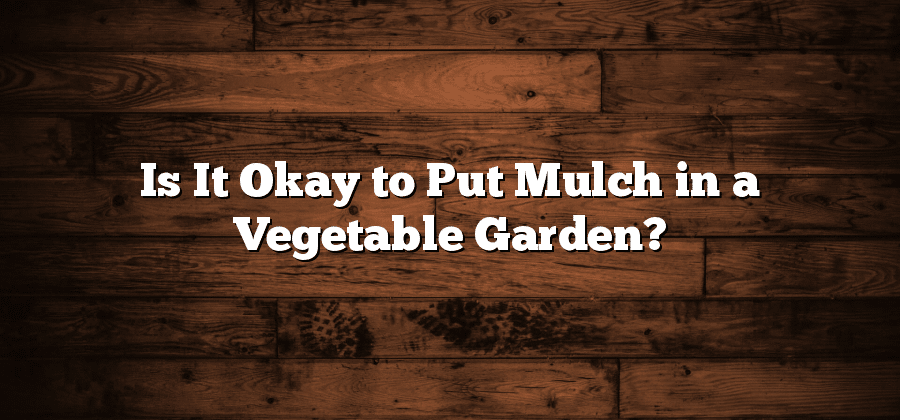Benefits of Using Mulch in Vegetable Gardens
Mulching is an essential practice that can greatly benefit vegetable gardens. One of the primary advantages of using mulch is its ability to regulate soil temperature. By covering the soil with a layer of mulch, gardeners can create a buffer between the hot sun and the delicate roots of their vegetable plants. This helps to keep the soil cool during scorching summer months, preventing heat stress and promoting optimal plant growth. Likewise, mulch acts as an insulating layer in colder climates, protecting the roots from freezing temperatures.
In addition to temperature regulation, using mulch in vegetable gardens also helps conserve soil moisture. The layer of mulch acts as a barrier, preventing evaporation of water from the soil surface. This is especially important during dry periods or in regions with limited water resources. By retaining moisture in the soil, mulch helps to ensure that vegetable plants have a constant supply of water, reducing the risk of drought stress and promoting healthy growth. Moreover, the reduced evaporation also means less frequent watering, saving both time and resources for the gardener.
Types of Mulch Suitable for Vegetable Gardens
Mulching is a common practice in vegetable gardening that offers numerous benefits. One important aspect to consider when using mulch is selecting the right type for your vegetable garden. There are several options available, each with its own unique properties and suitability.
Organic mulches, such as straw, grass clippings, and compost, are popular choices for vegetable gardens. These materials not only enrich the soil as they break down but also help prevent weed growth. They create a favorable environment for beneficial microorganisms, further enhancing soil health. In addition, organic mulches regulate soil temperature by providing insulation during extreme weather conditions. Another option is inorganic mulch, such as plastic or fabric. These materials effectively suppress weeds, retain moisture, and warm the soil. However, they do not provide the organic matter that organic mulches do. Carefully consider the needs of your vegetable garden to determine the most suitable mulch type for optimal growth and productivity.
How Mulch Can Help Conserve Soil Moisture
Mulching is a natural and effective way to conserve soil moisture in vegetable gardens. By providing a protective layer on the soil surface, mulch helps to prevent water evaporation, especially during hot and dry weather conditions. This not only helps to maintain the moisture levels in the soil but also reduces the frequency of watering, saving both time and resources.
In addition to reducing water evaporation, mulch also helps to improve the water infiltration rate in the soil. The mulch layer acts as a barrier, preventing heavy rain or irrigation water from compacting the soil surface. Instead, the water is allowed to slowly seep into the soil, ensuring that it reaches the plant roots where it is needed most. This promotes deeper root growth and enhances the overall water-holding capacity of the soil, further contributing to moisture conservation in the vegetable garden.
By incorporating mulch into your vegetable garden, you can effectively conserve soil moisture, ensuring optimal growing conditions for your plants. In the following sections, we will explore the various types of mulch that are suitable for vegetable gardens, as well as the additional benefits they offer. Stay tuned for more insights on how mulch can help improve your gardening experience.
Controlling Weeds with Mulch in Vegetable Gardens
Mulching is an effective technique for controlling weeds in vegetable gardens. By applying a layer of mulch to the soil surface, you can prevent weed seeds from germinating and growing. This not only reduces the amount of time and effort required for manual weeding, but also helps to conserve soil moisture and improve overall plant health.
One of the main benefits of using mulch for weed control is its ability to create a physical barrier. By covering the soil with a layer of organic mulch, such as straw or wood chips, you can block sunlight from reaching the weed seeds, preventing them from sprouting. This can significantly reduce the number of weeds that compete with your vegetable plants for nutrients and water, leading to healthier and more productive crops. Additionally, mulch can also help to smother existing weeds, preventing them from spreading and taking over your garden.
Mulch as a Natural Insulator for Vegetable Plants
As the temperatures start to drop, vegetable gardeners often face the challenge of protecting their plants from the cold. One natural and effective solution is using mulch as a natural insulator. Mulch serves as a barrier between the soil and the external environment, helping to regulate temperature and keep the plants warm during colder seasons.
Mulch acts as an insulator by trapping the air between its layers. This layer of trapped air acts as a buffer against extreme temperature fluctuations. When the weather gets cold, the mulch retains heat from the soil and prevents it from escaping too quickly. This helps to maintain a more stable temperature around the vegetable plants, ensuring they stay protected from freezing temperatures. Additionally, mulch also helps to prevent temperature fluctuations caused by sudden weather changes, providing a more conducive environment for healthy plant growth.
By acting as a natural insulator, mulch can significantly extend the growing season for vegetable plants. It allows gardeners to start planting earlier in the spring and continue the harvest later into the fall, giving them a longer window of fresh produce. Moreover, mulch helps mitigate the risk of frost damage, which can be detrimental to vegetable plants. Overall, utilizing mulch as a natural insulator is a cost-effective and sustainable solution for ensuring the well-being and productivity of vegetable plants, especially in cooler climates.






